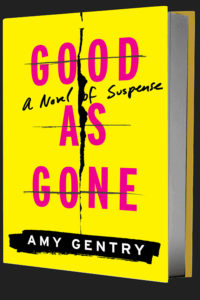The Writing Barn had a revealing and exciting evening on Wednesday with debut author Amy Gentry at our Words and Wine event. Amy has written book reviews, cultural criticism, and even a fashion column, but is now taking on the fiction world with her first thriller, Good as Gone. Attendees became privy to the development of Gentry’s suspenseful story—where the idea came from, how her writing process unfolded, and how readers are reacting to the novel. Amy provided many insights into her writing process, all of which served as guidance for writers of any genre.
 Good as Gone tells the gripping story of a thirteen-year-old girl who goes missing for eight years. Her family has lost all hope, but when a young woman who appears to be the missing Julie returns, her mother Anna begins a journey of rediscovery with the girl she hopes is her long-lost daughter. The novel evolved from an idea based on the Elizabeth Smart case, addressing the dangerous reality of a mother-daughter relationship that has been broken through years of distance.
Good as Gone tells the gripping story of a thirteen-year-old girl who goes missing for eight years. Her family has lost all hope, but when a young woman who appears to be the missing Julie returns, her mother Anna begins a journey of rediscovery with the girl she hopes is her long-lost daughter. The novel evolved from an idea based on the Elizabeth Smart case, addressing the dangerous reality of a mother-daughter relationship that has been broken through years of distance.
The Writing Barn founder Bethany Hegedus led a live podcast recording and book talk with Amy, discussing place and premise and the process of writing a thriller. Amy explained that she chose her hometown of Houston for the setting of her book because the backdrop of the city afforded the book with the necessary blend of urban and rural. Gentry photographed familiar places in order to gain a fresh perspective of her hometown, providing the reader with an objective and descriptive depiction of Houston.
Amy also offered several interesting approaches to developing her characters and plot. She emphasized that writers must discover what’s at stake in a story in order to develop intriguing, climactic fiction. We must ask, what are the risks being taken? Gentry also aimed to create unlikable characters—people in the story that are at odds in some way and difficult to write about. Amy noted that she struggled with the creation of the character of Anna, a mother experiencing the furthest thing from motherly love. Writers must challenge themselves to participate in developing characters unfamiliar to themselves in order to create engaging interactions.
 When giving advice to new thriller writers, Amy stressed the importance of letting the story develop itself:
When giving advice to new thriller writers, Amy stressed the importance of letting the story develop itself:
“Every sentence has to mean something. You can’t violate the spirit of the book. You owe the book a chance to be itself.”
The Writing Barn is appreciative of Amy’s thoughtful words shared with us all. Be sure to experience the suspense of Good as Gone for yourself!
